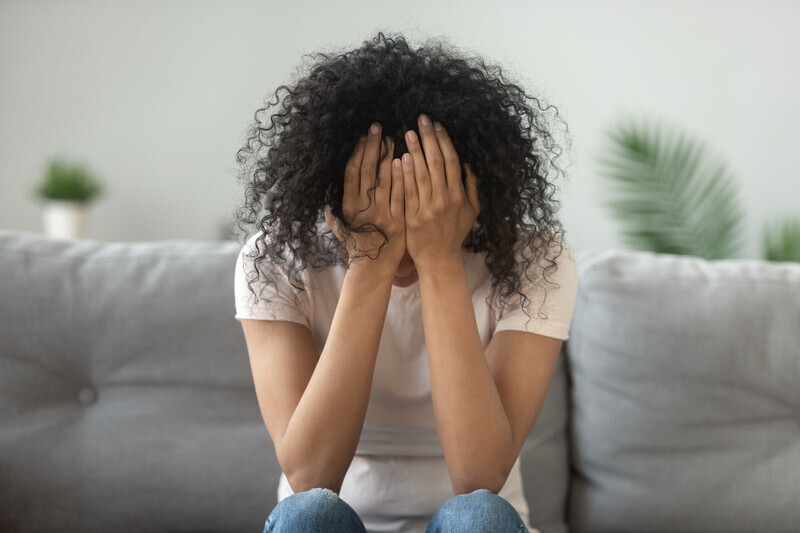hankyoreh
Links to other country sites 다른 나라 사이트 링크
Facing inequity, Korean women in 20s report higher levels of depression than male peers

A new survey of young people who have faced discrimination in housing, on the job, at school and in other areas of their daily lives found that women deal with more depression and anxiety than men.
According to a survey by the Seoul Foundation of Women & Family that was published in a recent issue of the Seoul Women and Family Policy Review, the average level of depression women in their 20s who have experienced discrimination reported was 7.93 points, while the average level of depression reported by men who have experienced discrimination was 6.57 on a 27-point scale.
The survey was carried out on 416 people (217 women and 199 men) in their 20s living in Seoul on April 13-19. The survey examined the level of depression (0-27 points), the level of anxiety (0-21 points), whether or not the subjects are economically active, and whether or not they have experienced discrimination in their everyday lives.
The level of anxiety was higher among women in their 20s as well. The average level of anxiety for women who said they have experienced discrimination in their everyday lives was 6.29 points, while the average level of anxiety for men who have experienced discrimination was 5.20.
Women were more likely to have experienced discrimination. The percentages of men who have experienced discrimination on the job or in their everyday lives overall were 41.3% and 37.2%, respectively, while the corresponding percentages for women were 65.0% and 65.9%.
Similarly, 30.5% of men said they have suffered discrimination at school, which was lower than the percentage of women who said the same (46.2%).
In terms of youth economic activity, a higher percentage of surveyed women (71.9%) were economically active than men (62.3%), but women make less money than men.
Among respondents, 42.3% of women who responded and 29.8% of men who took part said their average monthly income is 2 million-3 million won, while 35.5% of men and 27.6% of women said their average monthly income is 3 million won or more.
According to recent statistics from the Organisation for Economic Co-operation and Development, Korea has a gender pay gap of 31.1% — the highest among the 38 member states of the OECD, where the average gender pay gap is 12.0%. Korea has had the highest gender pay gap in the OECD since it joined in 1996.
“The gender pay gap reflects differences in the types of employment for women and men and in the low level of wages in occupations in which women are generally employed. Experiencing discrimination on the job raises women’s stress levels, which can have a negative impact on their mental health,” explained Lee Jae-kyung, an analyst at the Seoul Foundation of Women & Family.
“This confirms that the work environment and other social and structural factors have an impact on the mental health of women in their 20s. The government needs to devise a range of support measures to create a safe environment in society,” Lee added.
By Oh Se-jin, staff reporter
Please direct questions or comments to [english@hani.co.kr]

Editorial・opinion
![[Column] Life on our Trisolaris [Column] Life on our Trisolaris](https://flexible.img.hani.co.kr/flexible/normal/500/300/imgdb/original/2024/0505/4817148682278544.jpg) [Column] Life on our Trisolaris
[Column] Life on our Trisolaris![[Editorial] Penalties for airing allegations against Korea’s first lady endanger free press [Editorial] Penalties for airing allegations against Korea’s first lady endanger free press](https://flexible.img.hani.co.kr/flexible/normal/500/300/imgdb/original/2024/0502/1817146398095106.jpg) [Editorial] Penalties for airing allegations against Korea’s first lady endanger free press
[Editorial] Penalties for airing allegations against Korea’s first lady endanger free press- [Editorial] Yoon must halt procurement of SM-3 interceptor missiles
- [Guest essay] Maybe Korea’s rapid population decline is an opportunity, not a crisis
- [Column] Can Yoon steer diplomacy with Russia, China back on track?
- [Column] Season 2 of special prosecutor probe may be coming to Korea soon
- [Column] Park Geun-hye déjà vu in Yoon Suk-yeol
- [Editorial] New weight of N. Korea’s nuclear threats makes dialogue all the more urgent
- [Guest essay] The real reason Korea’s new right wants to dub Rhee a founding father
- [Column] ‘Choson’: Is it time we start referring to N. Korea in its own terms?
Most viewed articles
- 160% of young Koreans see no need to have kids after marriage
- 2[Reporter’s notebook] In Min’s world, she’s the artist — and NewJeans is her art
- 3[Editorial] Penalties for airing allegations against Korea’s first lady endanger free press
- 4Months and months of overdue wages are pushing migrant workers in Korea into debt
- 5Presidential office warns of veto in response to opposition passing special counsel probe act
- 6Hybe-Ador dispute shines light on pervasive issues behind K-pop’s tidy facade
- 7Vietnamese war victims speak of sexual violence by S. Korean troops for the first time
- 8The BTS story that no Koreans would have believed a generation ago
- 9Inside the law for a special counsel probe over a Korean Marine’s death
- 10Japan says it’s not pressuring Naver to sell Line, but Korean insiders say otherwise